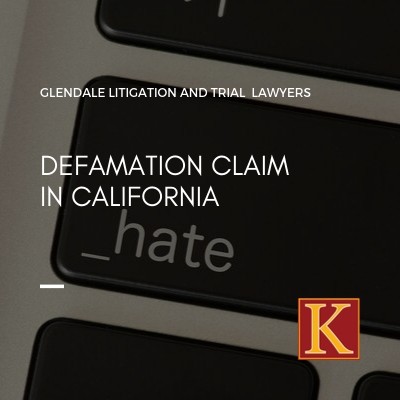Defamation involves a false statement made by one person about another person which causes harm to a person’s property, profession, business, or occupation.
Elements of Defamation
The plaintiff must be able to prove the following elements to establish a defamation claim in California:
- Defendant made an intentional publication of a statement of fact
- The fact is false
- The fact is unprivileged
- The fact has a natural tendency to injure or cause special damage
- Defendant’s fault in publishing the statement is at least considered negligence.
Methods of Making Defamatory Statements:
Defamatory statements are made using two methods: slander or libel
- Slander: According to California Civil Code Section 46, slander is a false and unprivileged publication, orally uttered, which charges any person with crime, imputes in a person the existence of an infectious, contagious, or loathsome disease, tends directly to injure him in respect to his office, profession, trade or business, imputes to a person impotence or a want of chastity.
- Libel: According to California Civil Code Section 45 libel is defined as a false and unprivileged publication by writing, picture, printing, effigy, or other fixed representation to the eye, which exposes any person to hatred, ridicule, contempt or obloquy, or which causes him to be avoided or shunned, or which tends to injure him in his occupation.
Defamation per SE
A statement is a defamation per se in case there is no need for extrinsic evidence to explain the statement’s defamatory nature. A plaintiff doesn’t need to show special damages as damages to the plaintiff’s trade, business, property, profession or occupation if the statement is defamation per se.
Defamation per Quod
Defamation per quod means that the statement is not defamatory on its face and requires proof and allegations of special damages. Examples of special damages can include lost profits and adverse employment consequences.
Public Figures
According to the First Amendment of the U.S. Constitution, when a public figure brings an action for defamation, in addition to all mentioned elements, he should also prove that the statement was made with actual malice. Thus, the public figure must prove that the person who made the defamatory statement knew that is was false.
Here are some examples of a public figure under California law:
- Author
- Television personality
- Real-estate developer
- Founder of a church
What Can a Victim Win in a Defamation Case?
There are different types of compensation available to the victims, who win defamation lawsuits. These include:
- Back pay
- Lost Wages
- Pain and Suffering
- Punitive Damages
Legal Defenses for Defamation Claims
There are several defenses available in defamation cases. Here are some of them:
- Defendant’s statement wasn’t published
- Defendant made a true statement
- Defendant’s statement was privileged
- Defendant’s statement wasn’t made with malice
- Defendant’s statement wasn’t made negligently
California Defamation Claim Video
Do you have any additional questions or concerns regarding defamation claims in California? Get in touch with KAASS Law for more information now.

